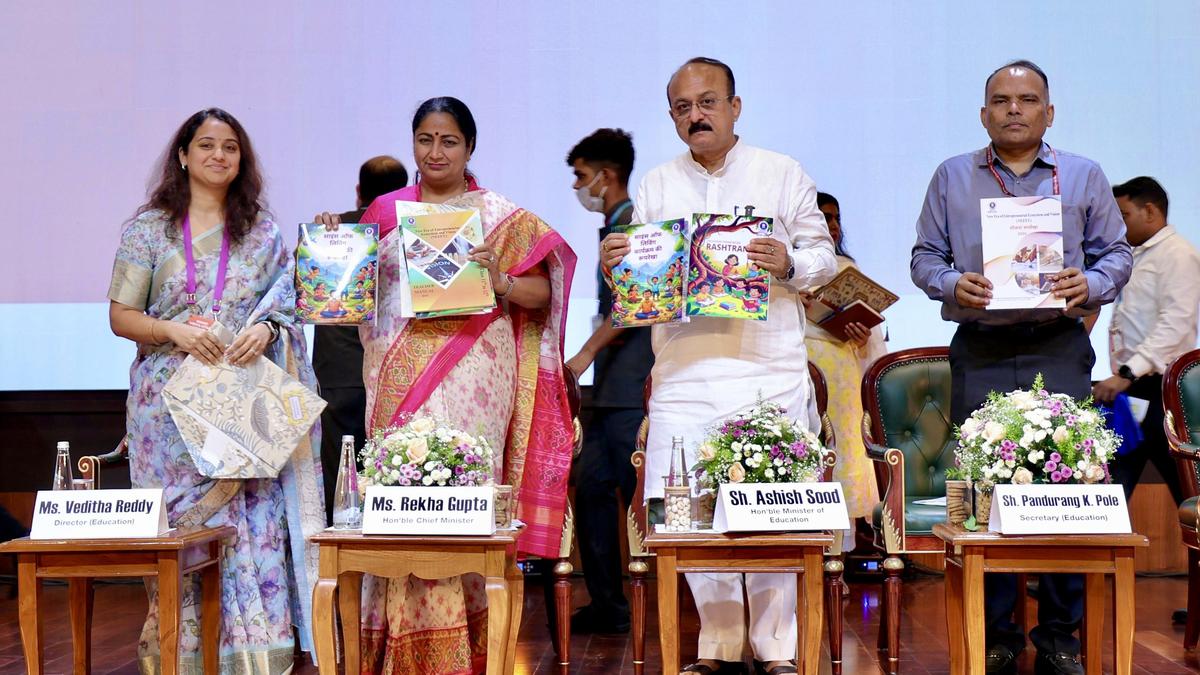By The Hindu Bureau
Copyright thehindu

Chief Minister Rekha Gupta on Thursday launched three new curricula – Rashtraneeti, Science of Living, and New Era of Entrepreneurial Ecosystem & Vision (NEEEV) – for the Delhi government schools.
Speaking at the launch event at Bharat Mandapam, Ms. Gupta said, “The new curricula will prepare students to write India’s future.”
She said the curricula have been designed with the aim of promoting nation-building.
The new curricula will replace the previous Aam Aadmi Party government’s Deshbhakti programme (launched in 2021), the Happiness curriculum (2018), and the Entrepreneurship Mindset (2019).
In a briefing on NEEEV, Education Minister Ashish Sood, who was also present at the event, said, “This pioneering initiative for students from Class 8 to 12 is designed to transform education by embedding a spirit of innovation, self-reliance, and entrepreneurship from a young age.”
Rashtraneeti, which will be taught from KG to Class 12, will include the study of governance, policymaking, leadership, and civic responsibility, said Mr. Sood. Science of Living, which will be taught from Classes 1 to 12, is rooted in Indian knowledge systems and will promote holistic health through yoga, ayurveda, and meditation.
The curricula have a grade-wise structure.
For instance, in the Rashtraneeti curriculum, students in the ‘foundational stage’ (KG to Class 2) will be taught the basics of civic awareness. Those in the ‘preparatory stage’ (Classes 3 to 5) will be taught civic responsibility. Students in the ‘middle stage’ (Classes 6 to 8) will be taught about civic engagement and leadership, while those in the ‘secondary stage’ (Classes 9 to 12) will learn about strategic thinking and governance, an official said.
The four-stage academic structure in school is part of the reforms introduced under the National Education Policy (NEP) 2020.
Similarly, in the Science of Living curriculum, foundational classes include recognising emotions and learning social behaviour through puppet shows, songs, and storytelling. Students in the middle classes will learn ethical reasoning, civic responsibility, and spiritual inquiry, according to the official.
Under NEEEV, which is aimed at teaching about start-ups, among others, a start-up competition will be conducted for students from Classes 9 to 12, with prize money of ₹20,000. The classroom training will also include foundational entrepreneurial learning with design thinking and interactive activities.
‘Support students’
Ms. Gupta urged schools to focus on retaining students in higher classes. “Results won’t improve if students are expelled in Classes 9 and 11. They should be encouraged and supported,” she said.
Stressing that her priority is to improve education rather than announce big-ticket projects, the CM said, “One flyover less can be built, but schools must be improved.” She assured that government schools would not face shortages of resources or infrastructure, including toilets, laboratories, playgrounds, and other facilities.



